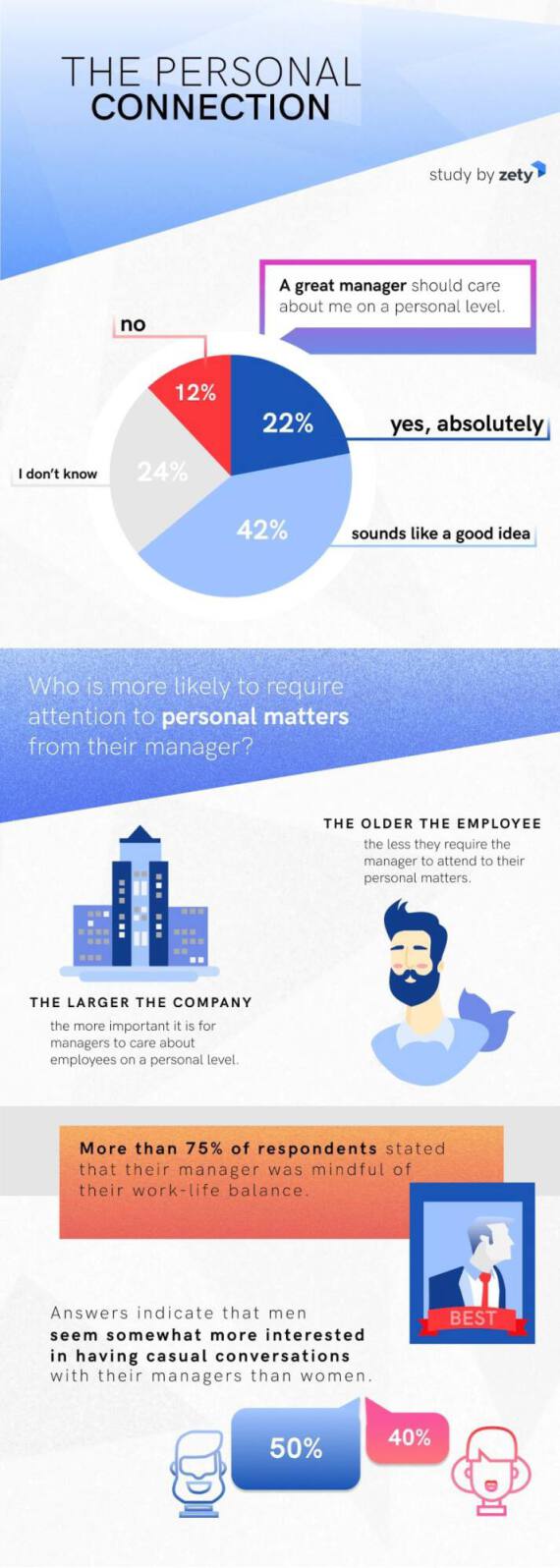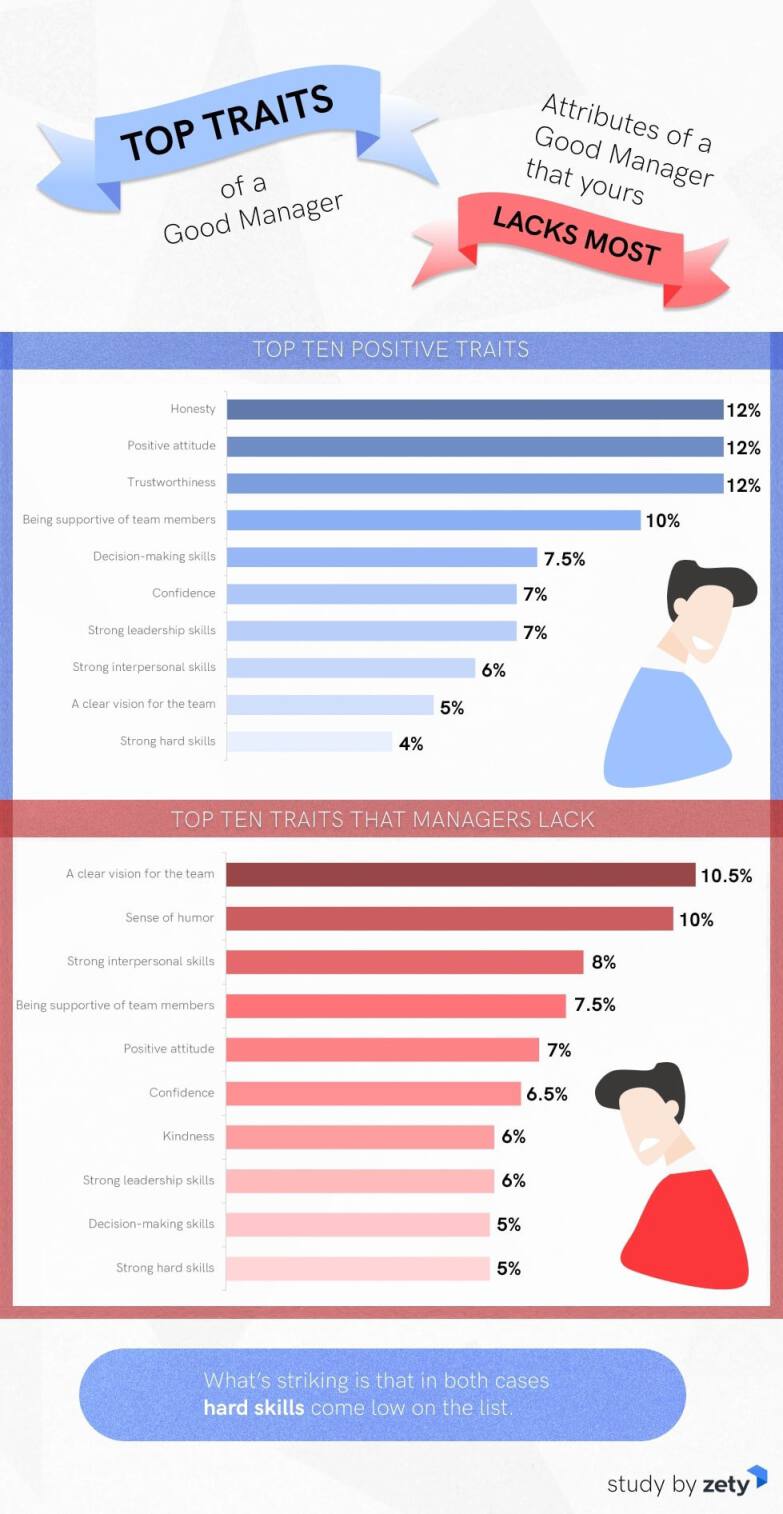
2023 HR Statistics: Job Search, Hiring, Recruiting & Interviews
The definitive list of human resource statistics and research for 2023. See data on resumes, job interviews as well as hiring and recruiting.
![What Makes a Good Manager: Qualities & Traits [2022 Study]](https://cdn-images.zety.com/pages/what_makes_a_good_manager_2.jpg?fit=crop&h=650&q=75)
Great managers are few and far between. Or… are they? We asked over 1,000 Americans about their expectations & experience to learn what it takes for a manager to be seen as great.

This is no secret—
Leadership drives performance.
The question is:
How to be a good manager? And what does it take to engage employees enough, so they deliver a top performance?
We surveyed 1,016 Americans to pinpoint the skills, behaviors, and characteristics of great managers. We asked about their expectations and day-to-day reality to see what works, what doesn’t, and what they really think of the managers they work with on a daily basis.

It’s obvious that feedback is crucial for professional development, but what kind of feedback would people want to hear from a great manager?
It turns out that 51% of respondents would like to receive both positive and negative feedback as long as it’s constructive. About 46% prefer positive feedback only (constructive as well as praise.) The final 3% would like the manager to focus on the negative.
Perhaps the so-called feedback sandwich is not ideal but being a good manager most definitely requires giving balanced opinions on employees' work.
Now—
When we looked at the results broken down by years of experience, it turned out that the least experienced workers crave positive feedback more than any other group—55% want positive feedback only, and 40% mixed. In contrast, for those with over 20 years in the workforce, the numbers are around 40% and 60% respectively.
But here’s the twist—
When we looked at age groups, the youngest of our respondents (18-24) were the least likely to require as much positive feedback as the rest.
What could this mean?
Well, the need for positive feedback seems better correlated with experience rather than age.
It’s also possible that Gen Zers are currently working gigs and doing jobs they’re not that invested in (or maybe they’re just hippier than their grandparents!).
And 25-34-year olds?
We’d hypothesize that it has a lot to do with their circumstances: they need positive feedback to feel secure at work because it’s their first serious job or they’ve just started climbing their career ladder; they might have started a family, need to pay back student debt and meet their mortgage deadlines.
In fact, this dovetails with findings of a recent study on giving negative feedback to Millennials which concludes that this age group is particularly sensitive to learning about their shortcomings, and will only accept negative feedback if they perceive it as “befitting them now or in the future.”
Finally, we wanted to confront the respondents’ expectations with reality, so we asked if they appreciate the feedback they get from their current managers—
And it turned out that a massive 85% do.
The conclusion is surprising but clear—
The vast majority of managers do a good job as far as giving feedback is concerned.
Next—
We asked respondents what great managers should focus on when leading their team:
Over 77% of the surveyed population believe that great managers should pick strengths. Interestingly, female respondents want their managers to focus on their strengths more than men.
Now, the results reveal that 77% say managers should focus on strengths but 65% say their manager does that. There’s a bit of a gap there.
Is work experience a factor?
Arguably, yes—
More than that—
There’s a visible trend showing that the more experienced the employee, the more managers tend to focus on leveraging his or her strengths.
This isn’t surprising considering the latest management trends—
Various publications and research suggest that in order to drive engagement and top performance, managers are to help people discover their strengths and put them to good use. Because people will do what they do best.
The optimistic conclusion is that, at the end of the day, two out of three managers actually focus on developing their subordinates' strengths.
We asked respondents to what extent they agreed that a great manager should always get involved in the details of every problem the team was facing.
What we thought we were asking about was micromanagement.
But now we’re not that sure—
To our surprise, a total of over 50% expect their manager to be hands-on. But the results also revealed that people tended to agree less the longer they worked.
So, is this still about micromanagement?
Probably not.
For newbies, it’s more likely to be about support, teaching them the job, and helping grow into a new role. For seasoned professionals… well, yes—they want more freedom and trust.
We followed up on this question and asked respondents how happy they were about the level of autonomy they had in decision-making at work.
And—
A whopping 85% feel good about the level of autonomy they’re getting from their managers.

Almost 65% of respondents believe a great manager should care about them on a personal level.
There are two observable trends:
How does this compare to day-to-day life?
One way of caring about subordinates is to ensure they have a good work-life balance. That’s why we asked respondents whether or not their managers care about this.
More than 75% of respondents stated that their manager was mindful of their work-life balance.
Interestingly, managers working in larger companies seem to care more about their team members’ work-life balance and workload.
Finally—
Since personal connections are often forged during casual conversations, we asked whether or not great managers should specifically allocate time for discussing non-work related subjects with their subordinates.
It turned out that less than half of the respondents think this is what great managers do.
Plus:
This came as no surprise—
Plus—
We noticed this becomes increasingly important as employees become more and more experienced.
What does this look like in real life? Do people feel listened to by the management?
We asked respondents if they felt that their manager appreciated their opinions and took them into consideration when making decisions.
There were almost no differences in answers between the genders, which suggests that both men and women feel equally appreciated and listened to.
We realized that the number of people who strongly believe that their opinions are taken into consideration grows together with the company size.
The answers further revealed that the clarity of communication was just as vital for men and women alike.
More than that—
The number of people who strongly agree with this statement grows with the respondents’ age and experience.
It seems that to be considered a good manager and leader you shouldn’t assume that more experienced employees require less explaining because of their very experience.
It looks like the opposite is true—
Experienced employees have grown to appreciate the value of clear communication, and know that time spent on clarifying things is anything but lost.

We asked respondents to identify the top 5 characteristics of a good manager from a list of 15 they believe every great manager should possess—
Note: Respondents could choose multiple answers. The percentage total doesn’t add up to 100%.
And which traits their managers show too little of—
What’s striking is that in both cases hard skills come low on the list.
This suggests that people don’t believe that technical expertise is essential for a manager to succeed in the role. But, at the same time, managers seem knowledgeable enough not to give anyone a good reason to complain.
These findings—though to some may appear counterintuitive—are in line with the results of recent research on the correlation between managers’ work-related personality and occupational well-being of subordinates, as well as the conclusions of the State of the American Manager Report from Gallup:
Companies use outdated notions of succession to put people in [managerial] roles. They base hiring and promotion decisions on individuals’ past experience or tenure, or they give them the manager job as a “reward” for their performance [. . .] These organizations overlook talent, and when they do, they lose. They spend needless time and energy trying to fit square pegs into round holes.
We asked respondents to what extent they agreed that their manager was great.
Over 30% of the surveyed population strongly believed their manager was nothing short of wonderful, and an additional 40% admitted they were pretty happy about their managers.
Only 11% of respondents were dissatisfied with their managers. The remaining 15% were neither happy nor unhappy.
In total, over 70% of respondents admit they work with good managers. And it looks like the largest number of truly great managers work in the biggest companies, as over 36% of respondents who work for organizations employing 1,000+ people believe their manager is doing a fantastic job.
Now—
Since the majority of respondents are satisfied with their managers, the answers to the question probing their engagement shouldn’t come as a surprise.
Almost 52% of the surveyed population admitted they were very engaged, and 37% reported they were somewhat engaged. This gave us a total of almost 90% of people who believed they were engaged employees.
Also—
We noticed that the level of engagement goes up as the respondents become more and more experienced.
The question is:
Is someone’s level of engagement indicative of whether or not they believe their manager is great?
Yes—
But there seem to be other factors at play, too.
Here’s a list of 4 best predictors for what makes a great manager:
Here’s a rundown of the most important qualities of a great manager that emerge from the survey:
Finally, if you want to work under a great manager, you’re most likely to meet one in a large organization.
Methodology and Limitations
For this study, we collected answers from 1,016 respondents via Amazon's Mechanical Turk. Respondents consisted of 52% males and 48% females. Our sample's average age was 36 with a standard deviation of 11. Our sample comprised 20% of people with less than 5 years of experience, 26% between 5 and 10 years of experience, 17% between 10 and 15 years of experience, 24% between 15 and 20 years, and 13% of respondents had over 20 years of experience. 42% of our respondents worked for companies employing from 50 to 1,000 people, 24% for companies with under 50 employees, and 32% for companies with 1,000+ employees. The remaining 2% weren't aware of the size of their company.
This self-report study investigated people’s expectations as to the ideal manager and confronted them with day-to-day reality of working with their superiors. Respondents were asked 25 questions, most of which were scale-based or multiple choice. As experience is subjective, we understand that some participants and their answers might be affected by recency, attribution, exaggeration, self-selection, non-response or voluntary response bias. However, given the gender and age makeup of our large sample, as well as the fact that the official labor force participation rate in July 2019 was 63%, the study can be generalized to the entire population.
What is more, a review of literature and relevant studies suggests that results obtained in the survey corroborate hitherto results, and add an extra layer of data by comparing subjective experience against third-party data on best management practices.
Fair Use Statement
Did you learn something new about what makes a great manager? Share these results with your readers for any noncommercial use by including a link back to this page so that our contributors earn credit for their work.
Sources:
Zety’s collection of over 500 resume examples, 100+ cover letter samples, and CV format guides includes professional candidate profiles and key achievements that can inspire job seekers to write their own job applications.
The definitive list of human resource statistics and research for 2023. See data on resumes, job interviews as well as hiring and recruiting.
How to write a resume that will get you the job you're looking for? This step-by-step guide will show you the best resume examples, and you can write a resume in a few easy steps.
200 essential sales statistics sales pros must know in 2022. Gauge your competition, see what the industry benchmarks are, and more.

![200+ Sales Statistics [Cold Calling, Follow-up, Closing Rates]](https://cdn-images.zety.com/pages/sales_statistics.jpg?fit=crop&h=250&dpr=2)